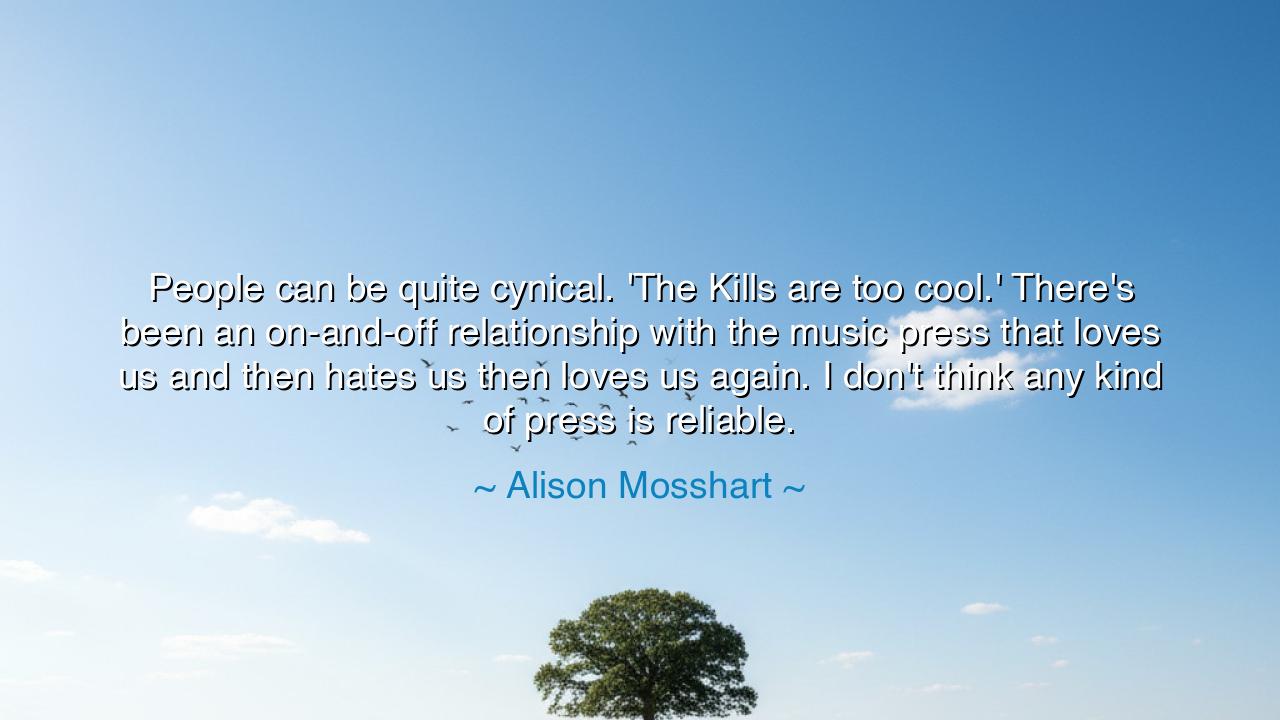
People can be quite cynical. 'The Kills are too cool.' There's
People can be quite cynical. 'The Kills are too cool.' There's been an on-and-off relationship with the music press that loves us and then hates us then loves us again. I don't think any kind of press is reliable.






“People can be quite cynical. ‘The Kills are too cool.’ There’s been an on-and-off relationship with the music press that loves us and then hates us then loves us again. I don’t think any kind of press is reliable.” These words by Alison Mosshart reflect a deep and timeless truth about human nature and the ephemeral nature of fame. The quote speaks to the fickleness of the public eye—how admiration can quickly turn to disdain, and praise can swiftly fade into criticism. In the world of music, as in many other realms of life, the press—often the vessel of public opinion—can be both fickle and untrustworthy, offering fleeting moments of adoration only to pull away just as swiftly. Mosshart’s words remind us that public approval is an unreliable foundation upon which to build one’s self-worth.
In ancient times, public opinion was no less volatile, though expressed in different forms. The Roman Empire had its own version of the modern press: public forums where the voices of orators could shape the views of the masses. But even in those days, the praise of the people was not guaranteed to be long-lasting. Julius Caesar, one of the most celebrated figures in Roman history, knew this well. Though revered for his military victories and political power, his relationship with the people of Rome was fraught with contradictions. Caesar’s popularity was at times unmatched, yet his ambition and the eventual concentration of power led to his downfall. His rise and fall illustrate the dangers of relying too heavily on public admiration and the fickleness of the crowds. Just as Caesar was loved by the people but ultimately betrayed by them, so too is fame often a double-edged sword.
Consider also the story of the ancient Greek playwright Sophocles, who, though celebrated during his life, faced his own battles with public reception. His works, such as Oedipus Rex, were not always met with unwavering praise, and many of his contemporaries did not fully appreciate the depth of his tragedies. Like Mosshart, Sophocles understood that the public’s opinion could be unpredictable, and that the true value of one’s work lies not in the accolades, but in the work itself. Just as Sophocles continued to write despite fluctuating public reception, Mosshart's quote teaches us the importance of staying true to one’s vision and not letting external validation define our worth.
Mosshart’s reflection on the unreliable nature of the press can be seen as a modern echo of the ancient wisdom that external validation—whether from the masses, the media, or any other source—can never provide lasting fulfillment. The pursuit of external approval, as the ancient philosophers taught, is a path to emptiness. Socrates warned against the dangers of relying on the praise of others, teaching that true contentment comes from living in accordance with virtue and wisdom, rather than seeking fleeting applause. In the same way, Alison Mosshart recognizes that the press, like the public forums of ancient times, can be unpredictable and ultimately unreliable. To place one’s value in the hands of such forces is to court unnecessary suffering.
In the modern world, the rise of social media and the 24-hour news cycle has only intensified the transitory nature of public opinion. Figures in the public eye, like The Kills, may find themselves caught in the web of praise one moment and criticism the next. This cynicism and flip-flopping of sentiment reflect the impermanence of fame and the human tendency to focus on the new and the novel while quickly discarding what is no longer deemed relevant. Yet, like Mosshart, we must learn to navigate this tempestuous landscape without being swayed by the winds of external judgment. To find peace and purpose, we must draw from a deeper well of inner conviction.
The lesson from Mosshart’s quote is clear: the only true measure of value lies in the work itself, in the passion that drives one’s art or purpose, rather than in the ever-changing opinions of the crowd. Press and public reception are fleeting, and if we place our worth in them, we will forever find ourselves at the mercy of their whims. Just as the great figures of antiquity found strength in their own values and vision, so too must we cultivate an inner foundation that is not swayed by the fickleness of the outside world.
In our own lives, let us be mindful of where we seek validation. Let us focus on the things that give us meaning—whether it is in our work, our relationships, or our personal growth. Rather than being led by the ever-changing opinions of others, we must trust in our inner wisdom and purpose. Like Alison Mosshart, we must remain steadfast in our path, knowing that the love of the people and the praise of the press are fleeting. True fulfillment comes from within and from the unwavering commitment to our own journey.






AAdministratorAdministrator
Welcome, honored guests. Please leave a comment, we will respond soon